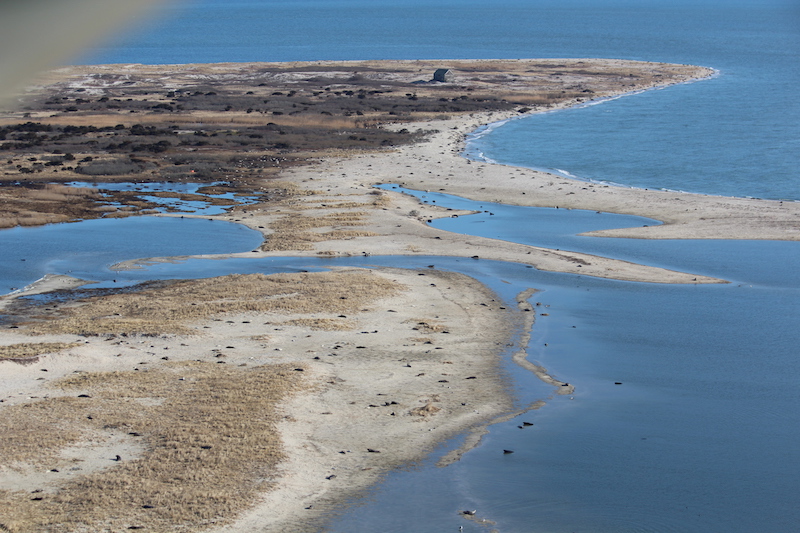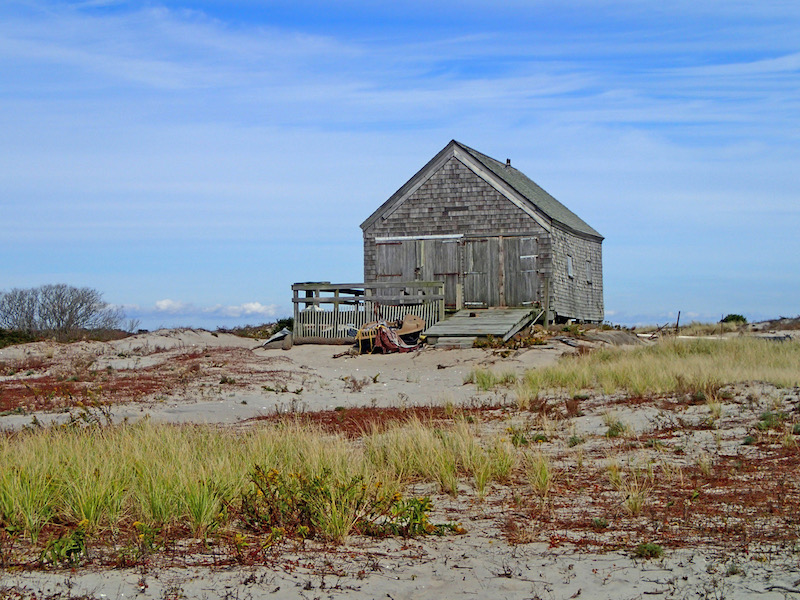My first trips to Muskeget in 2020, in late January and four months later on Memorial Day weekend, perfectly sandwiched the coronavirus pandemic. In May, I was eager to see one of the few spots in the country untouched by the virus. It turned out that the island had been touched, if not by the virus, in some major unpredictable ways over four hurricane-less and blizzard-less months.
The camp had been pummeled by strong winter and spring winds scouring away much more of its sand dune foundation leaving the only surviving human structure on the island as if atop a mini Sand of Gibraltar surrounded by a dry moat. Was Muskeget preparing to take its next victim?
Beyond that unwelcome talisman, some of the island’s key mammal and bird species were discovered in more numbers and different places than anything I could recall over earlier years.
The large storied gray seals which normally depart the island completely with their new pups by mid March for nearby shoals and beyond were plentiful in the shallow waters, and surprise, three small colonies of 100 or more each and many isolated youngsters were hauled-out on the island proper itself. Why? Was it the silence of the lambs, with no noises of distant boats or planes to disturb them?
Breeding pairs of Canada geese were everywhere, watching, waiting, honking, flying low and landing nearby when approached. More than I had ever seen on Muskeget before. Many eider ducks, the spectacular males and dusky hens who typically migrate as far as Alaska, were making themselves known as hens tried to claim nesting spots in the beach grass from some of the gulls.
The biggest surprise on the seabird front was the number of talkative, high-pitched terns working the island and starting to nest. Over recent decades, a single colony of 200 protected terns was noticeable. Now they were everywhere — common, roseate or arctic varieties. The few hundred max from before had bloated to a few thousand.
The most whimsical discovery of all was man-made. On the island’s widest out-of-way beach, near a large tern nesting area, sat parallel rows of large, bleached white sea clam shells inscribed with eight-foot long letters on the sand. MARRY ME. It’s clear the proposal was meant to be seen from the air, produced perhaps by or for a pilot. Or maybe by someone flying a drone to record the proposal and post it online. It had to have been recent, or strong winds or tides would have ruined it.
So our small party was not the first on the island since the winter pandemic after all. A salty Kilroy had proceeded us. I can only hope that he or she owns up to it to learn whether the seashell proposal worked or not, and thus to fulfill another Muskeget-only story.
Excerpted from Muskeget: Raw, Restless, Relentless Island by Crocker Snow Jr., first published in 2015 and revised and reprinted last year. A journalist who lives in Ipswich, Mr. Snow has been going to Muskeget since he was first dropped there at age nine by his father, a pioneer pilot. He has visited and experienced the treeless, uninhabited 250-acre island that his family is major owner over since 1950. He considers himself the island steward to keep it forever wild.
The book is available at Edgartown Books and Bunch of Grapes, and Mitchell’s on Nantucket. Mr. Snow is scheduled to give a talk at the Martha’s Vineyard Museum in January 2022.






Comments (3)
Comments
Comment policy »